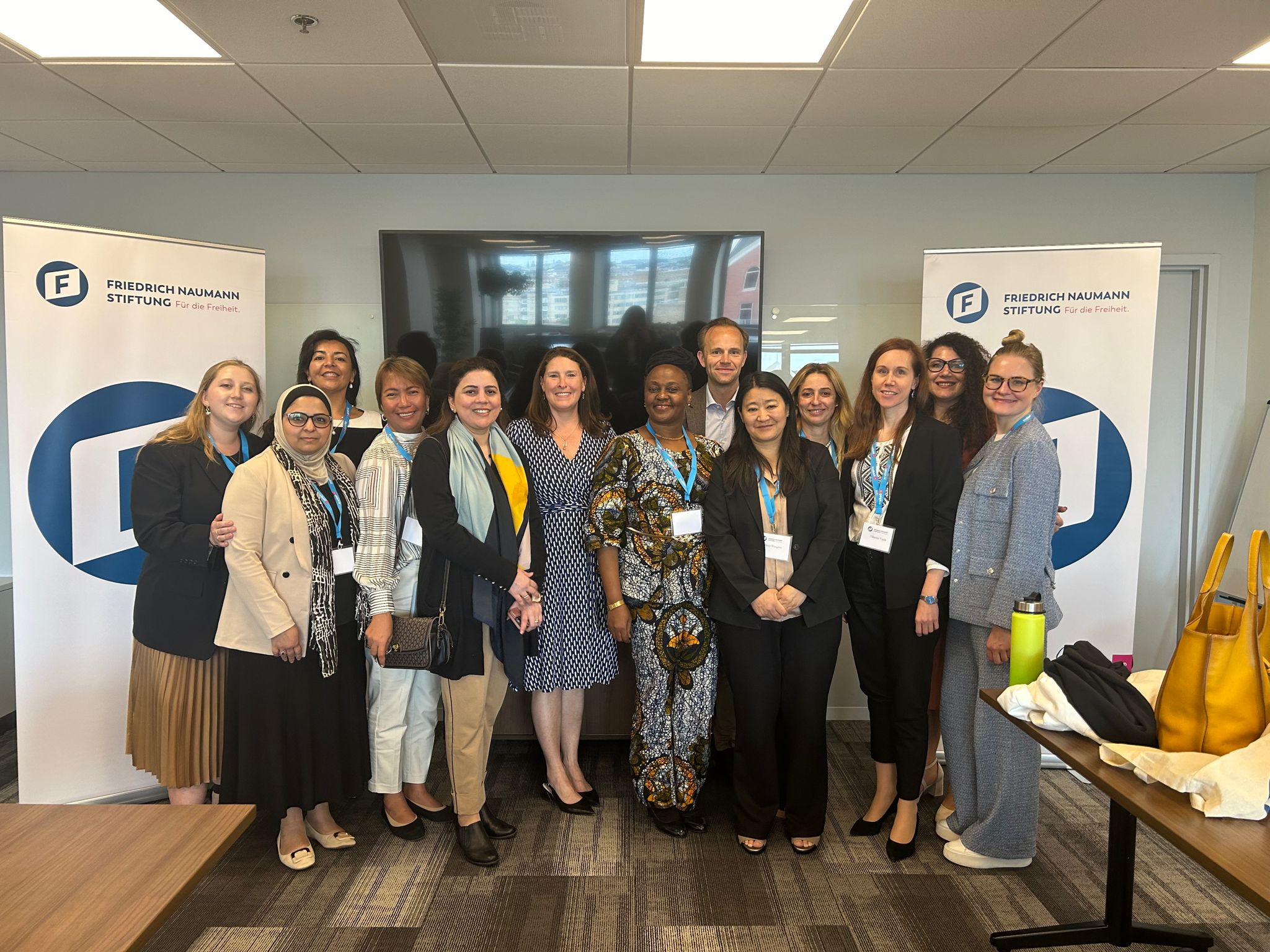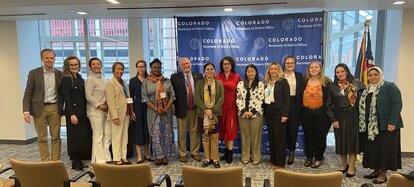Study Tour
A New Age of Women in Politics

Importance of developing an international network of experts on women's training
In early May 2024, the Friedrich Naumann Foundation for Freedom organized the Study Tour "A New Age of Women in Politics," held in Washington DC and Denver, United States. Here, we share the experience of one of the Latin American participants, Ximena Riquelme from Chile. Ximena is the Director of Strategic Projects and leader of civil society organizations that promote women's participation in her country. She is a promoter of liberalism and a General Counselor of EVOPOLI.
The study tour "A New Age of Women in Politics" aims to achieve the objectives set according to the goals of the World Order and Globalization Hub, an initiative of the Friedrich Naumann Foundation to create regional centers of specialized knowledge on pressing international issues. The Hub fosters dialogue among political, business, and scientific multipliers to develop innovative and mutually beneficial policy solutions.
Specifically, this project seeks to promote dialogue on the topic and importance of women in positions of power, particularly reaching those involved in liberal parties, examining the problems and obstacles women face on the ground and ways to mitigate them, developing an international network of experts on women's training, and creating opportunities for sustained engagement between participants and experts.
Ximena shares her impressions and indicates how women's participation in decision-making in society can be strengthened.

We Must Plant the Seed of Political Leadership in New Generations for This to Change
FNF: What did it mean for you to be selected to participate in the Study Tour "A New Age of Women in Politics," and how do you value this opportunity?
XR: I am deeply grateful to the Friedrich Naumann Foundation for Freedom for this unique opportunity. This program has not only allowed me to interact with top-level leaders and experts but also to integrate a network of participants from around the world who are contributing, in each of our countries, to closing gender gaps. The experience has strengthened my commitment and personal purpose to increase women's participation in decision-making in society, both in politics and civil society. I greatly value the reflections we developed, the lessons learned, and the connections we made, as I firmly believe they are essential for building a more equitable and inclusive future.
FNF: Could you share a specific moment during the Study Tour that had a profound impact on you and explain why it was meaningful to you?
XR: It was impressive to visit the buildings that represent the highest power in the United States, such as the White House, the Capitol, and the World Bank, but I was particularly struck by The Woman's National Democratic Club (WNDC), a center for civic engagement, learning, and political action founded in 1922. It is a house-museum full of testimonies of women who have fought for democracy, where we could learn very personal stories of iconic figures like Eleanor Roosevelt, Hillary Clinton, and Michelle Obama. At the WNDC, we participated in a discussion on gender perspective inclusion approaches, where we spoke with world leaders on these topics. Having role models like Tea Trumbic, Laura Whitaker, Susan Markham, Christian Nunes, Stephenie Foster, and Nadia Mouzykina was inspiring and also challenging for the group of participants.
FNF: In your meetings with leaders and experts in Washington DC and Denver, was there any advice or lesson that you consider particularly valuable for your career and why?
XR: Thanks to visits to the Progressive Policy Institute (DC) and the Wezesha Dada Center (Denver), I was amazed by the transparency observed in the political principles among civil society organizations. Ideology is not hidden; it is presented clearly and is not a topic of discussion, as often happens in Latin America, for example. In this same context, in the forum held at the WNDC, we discussed strategies for building a more inclusive future. One of the panelists' advice was that women leaders must be present in civil society and, above all, master fundraising strategies for our initiatives. This resonates with me, especially due to the funding crisis of NGOs in Chile due to corruption events.
In Denver, we met with Simone Ross from the Colorado Women's Chamber of Commerce, and it was very inspiring to learn about their efforts to incorporate women into male-dominated sectors and the need for soft skills training to better manage their lives (confidence, negotiation). Crossing borders is another valuable idea for collaborating with other women. At a lunch with Angie Johnston, founder of the social project "I See You," which works on the personal and economic empowerment of women in the Dominican Republic, she shared her experience and opened our perspective for international cooperation on a very human scale.
FNF: How would you describe the dynamics and interaction among the participants of the Study Tour? What impact did this interaction have on your perspective on female leadership?
XR: The group of women I shared this experience with is truly inspiring. Public servants, researchers, NGO founders, congresswomen, and officials from liberal political parties from many countries (Germany, Argentina, Armenia, Chile, Bulgaria, Bhutan, Philippines, Hungary, Jordan, Lithuania, Pakistan, and Tanzania) were present. Thanks to internal work moments, we could share our experiences in different roles and contexts. This allowed us to quickly connect with transversal challenges and identify successful experiences from other countries that would be appropriate to review to strengthen our local strategies. A collaborative and sisterhood-filled space was generated.
It is important to note that, although we come from different democracies (some more strengthened than others), together we reaffirmed two underlying issues in all realities: violence against women in all its forms and our low representation in power. It is sad to see that globally, if we are born women, we are highly likely to be victims of violence and not be considered in decision-making spaces. Ergo, there are fundamental issues that we must face together.
FNF: Throughout the program, various topics related to gender equity and politics were discussed. Was there any idea or perspective that changed your way of thinking about these topics?
XR: During the extensive program, we met with national and global leaders in Washington DC, as well as congress members and leaders at the regional or local level in Denver, from public, international, and civil society entities. I bring a more nuanced perspective on the discrimination faced by black people in the United States. It is harsher than it appears from a distance. The questioning of their style, beliefs, and the regulations developed in their favor show how deep the gap is; it is a human rights and gender issue. In this same reflection, while the low participation of women in the United States is expected, the figures for black women are truly impactful: only 2 out of 200 congress members. I also learned about the involvement of the private sector in building a liberal democracy. The modernization of society presents us with challenges and opportunities to promote democracy, and many companies contribute to civil society organizations through donations.
I bring more awareness of the need for gender perspective and intersectionality in political campaigns, as discussed with Bianka Emerson of Colorado Black Woman for Political Action. Susannah Wellford, CEO of Running Start and a board member of Represent Women, inspired us with her phrase: "We must plant the seed of political leadership in new generations for this to change." We must focus policies on girls and adolescents. And indeed, what we can observe from so many meetings and shared experiences is the lack of conviction among decision-makers to be more effective in including us in the equation. According to researchers, the data exists. So, what is failing for society to truly trust women in power?
FNF: What aspects of the program do you consider most useful for fostering an international network of women in politics, and how do you plan to maintain these connections in the future?
XR: The daily interaction we had, especially at the beginning of the program, was crucial for building trust among all of us. Our roles and challenges are very similar, and each of us is promoting women in various spaces. Therefore, it is natural that, given our personal purposes, we connect. The support of the foundation's team was essential for achieving this rapid communion. Additionally, as the literature says and as the experts we contacted reinforced, collaboration networks are imperative. Many of them generously offered us support in the initiatives we sustain in different countries.
As a group, we have just finished the program, but we are already organizing. We are committed to meeting virtually and defining a common purpose to move forward together, with the foundation's support, to distill what we have learned and develop a common work proposal that addresses the core issue: increasing women's participation in power and politics.
About the Participant
Ximena Riquelme, Director of Strategic Projects, leader of civil society organizations, and General Counselor of Evópoli in Chile.
